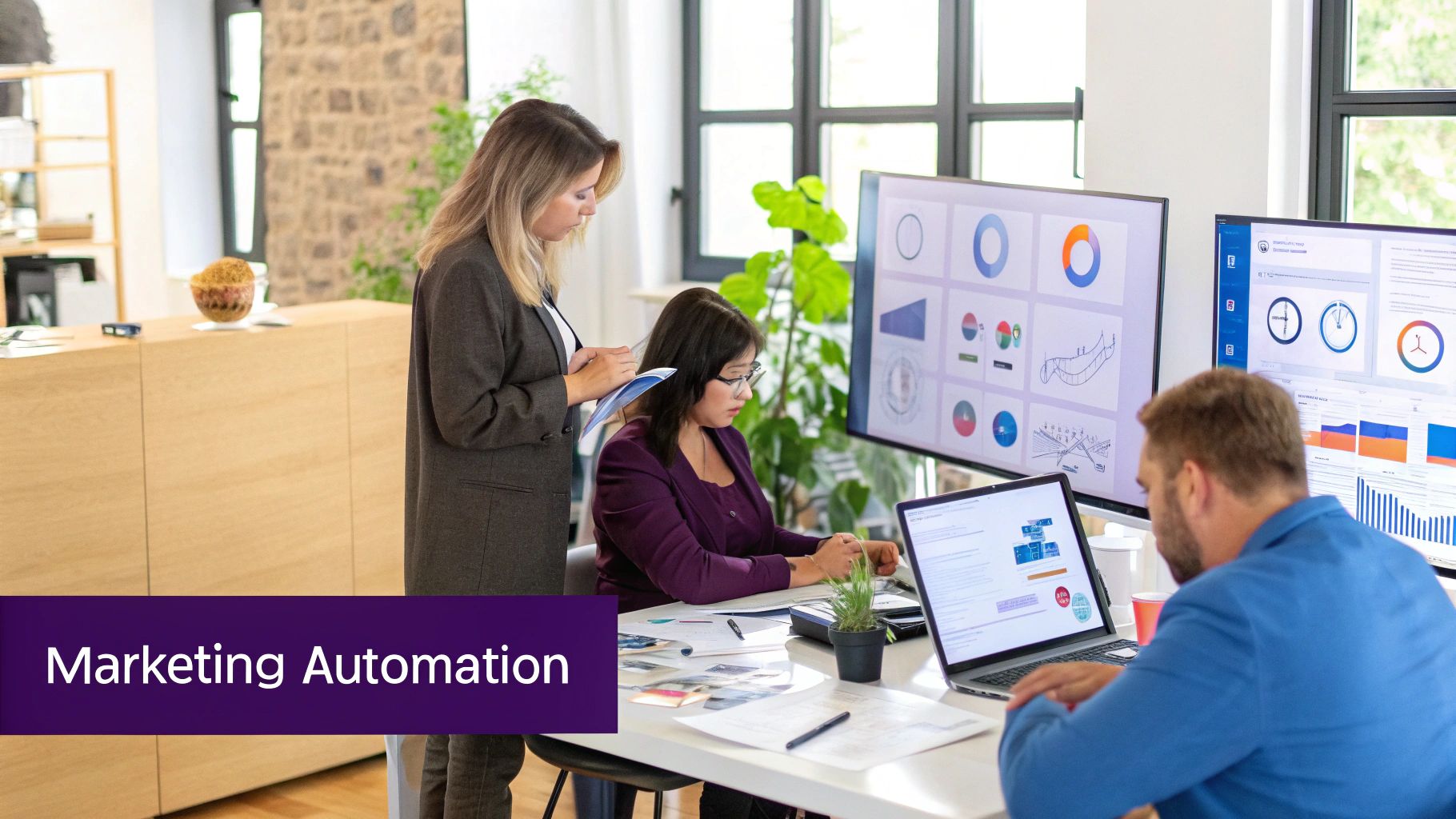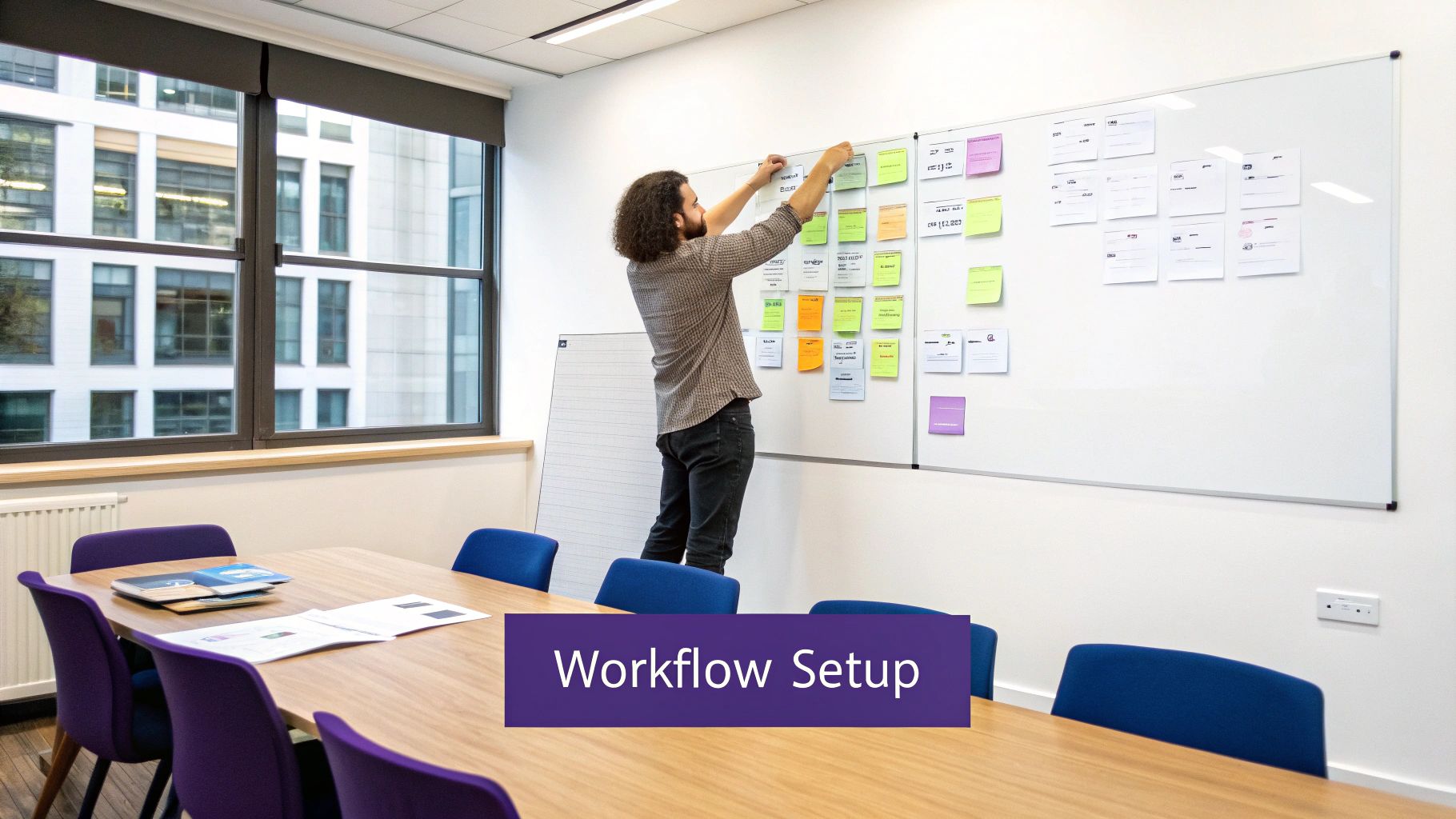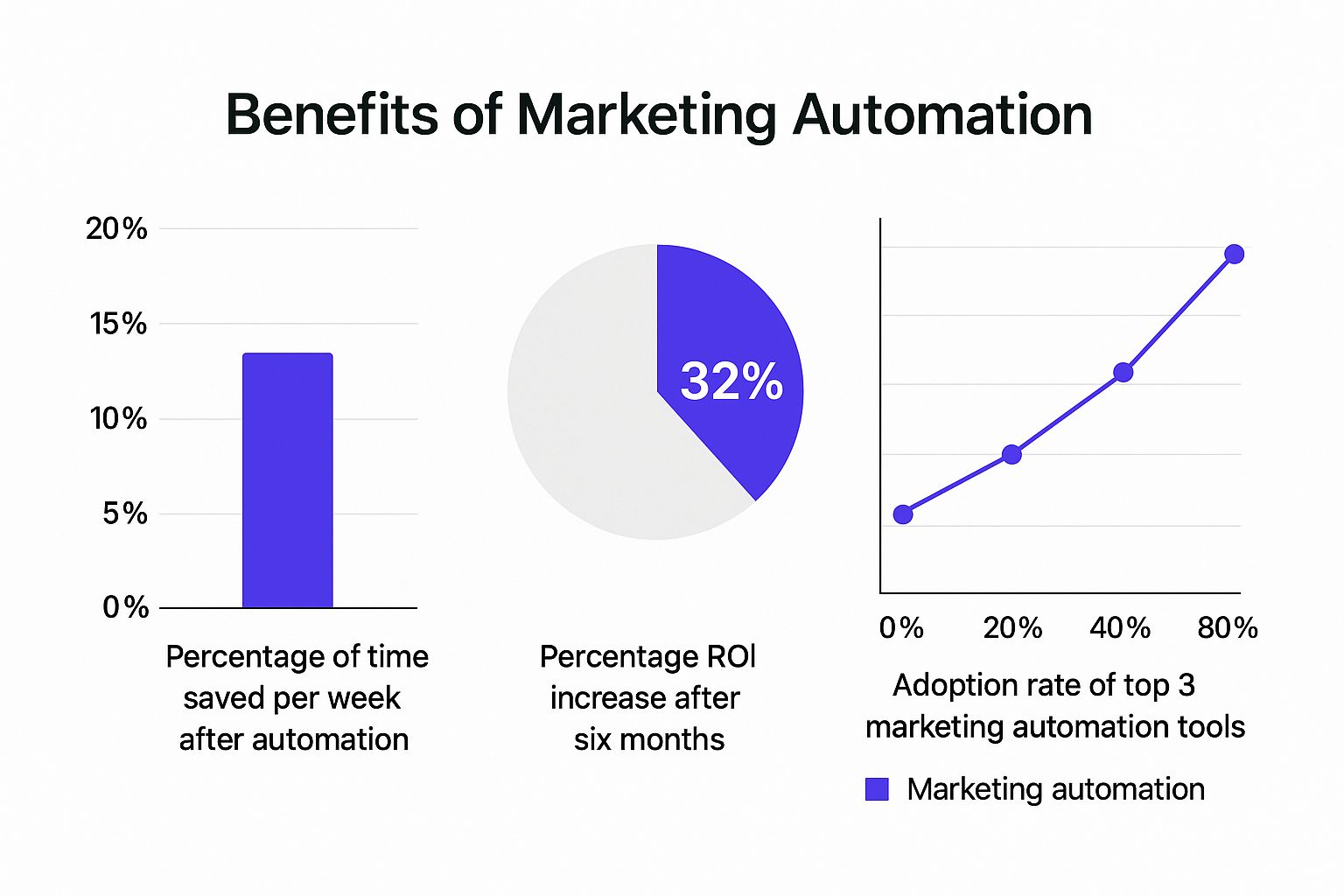Marketing Automation for Agencies: Boost Your Growth
Learn marketing automation for agencies with proven strategies to optimize and scale your client success. Discover expert tips today!
Posted by
Understanding The Marketing Automation Revolution

The marketing landscape is constantly shifting, and for agencies, marketing automation has become less of a luxury and more of a requirement. This change is fueled by several factors, including evolving client expectations and the growing complexity of modern marketing. Agencies must adapt to these changes to stay competitive and deliver the results clients need. For agencies looking to integrate marketing automation, Okzest offers specific solutions on their Marketing Agencies page.
Why Automation Is Essential for Agencies
Clients now expect quick results and highly personalized experiences. Simultaneously, agencies must manage numerous campaigns across multiple channels, making scalability a primary concern. Marketing automation tackles these challenges by streamlining operations and facilitating personalized communication at scale. This allows agencies to prioritize strategy and creative work instead of getting bogged down in manual tasks.
Market Drivers and Adoption Patterns
The demand for personalized customer experiences, combined with the need for more efficient marketing operations, is a key driver in the growth of marketing automation. The global marketing automation market is expected to reach $7.44 billion by 2025, with a CAGR of 9.5% from 2024. More detailed statistics can be found here. This impressive growth demonstrates the recognized value of automation across agencies of all sizes. However, adoption rates vary, with larger agencies often taking the lead due to their greater resources and complex client needs.
Solving Operational Challenges
Internal agency challenges, in addition to client demands, are also driving the need for automation. Many agencies grapple with repetitive tasks, inconsistent workflows, and difficulty measuring campaign performance. Automation offers a solution by standardizing processes, enhancing data collection, and providing real-time performance insights. This increased efficiency frees up time and resources, allowing agencies to focus on high-value activities like strategy and client relationship management, leading to improved profitability and a more competitive market position.
Building Automation Strategies That Actually Drive Growth

Implementing marketing automation tools like HubSpot is just the first step. Successful agencies go beyond basic setup. They develop comprehensive strategies that maximize return on investment (ROI). This involves designing workflows. These workflows not only automate tasks, but also enhance the creative output of their teams. Effective marketing automation begins with mastering lead generation. A helpful resource on this topic is available: generate leads for your marketing agency.
Designing Workflows That Amplify Creativity
Top agencies understand that automation should complement, not replace, human creativity. They design workflows to handle repetitive tasks. This frees up their teams. Now, teams can focus on strategic thinking and innovative campaigns.
For example, automating social media posting schedules is helpful. Marketers can then dedicate more time to crafting compelling content. They can also better engage with their audience. This approach ensures automation enhances, rather than hinders, creativity. Learn more: How to master marketing automation strategies.
Client Onboarding and Retention Through Automation
Effective client onboarding is essential. It demonstrates value and builds relationships. Automated onboarding sequences deliver personalized welcomes. They provide resources and guide clients through initial project stages. This creates a positive first impression.
Automated follow-up and performance reports keep clients informed. This fosters long-term retention. Proactive communication shows commitment to client success and builds trust.
Scalable Campaign Structures for Growth
As your agency grows, automation strategies must scale. Standardized campaign templates and automated reporting dashboards are key. These allow you to manage increasing client work without sacrificing quality.
This scalability ensures your agency can handle growth. It maintains consistent service delivery and optimizes resource allocation. This helps maintain profitability. This also ensures consistent brand messaging across all client interactions.
Let's explore some common automation strategies and their benefits. The following table compares different approaches. It outlines which agency types they best suit, typical implementation timelines, and potential ROI.
Agency Automation Strategy Comparison
| Strategy Type | Best For | Implementation Time | Expected ROI |
|---|---|---|---|
| Basic Email Automation | Small agencies, freelancers | 1-2 weeks | 10-20% |
| Advanced Workflow Automation | Mid-sized agencies | 4-8 weeks | 25-50% |
| Integrated Platform Automation | Large agencies, enterprise | 3-6 months | 50-100%+ |
This table demonstrates how different levels of automation can benefit various agencies. While basic email automation offers quick wins for smaller agencies, larger organizations can achieve substantial ROI with more integrated platform automation. Choosing the right strategy depends on your agency's size, resources, and growth goals.
Leveraging AI-Powered Automation For Competitive Advantage

Artificial intelligence is transforming the way agencies operate. This exploration delves into how agencies are using AI-powered automation to enhance client outcomes. We'll examine practical applications, such as personalized content and predictive analytics. These tools help optimize campaigns proactively, addressing potential issues before they impact performance.
AI-Driven Personalization and Predictive Analytics
Artificial intelligence (AI) empowers agencies to personalize content at scale, ensuring that the right message reaches the right person at the optimal moment. Predictive analytics, another AI-driven tool, helps anticipate market trends and adapt campaigns accordingly.
This proactive strategy maximizes impact and minimizes wasted ad spend. For example, AI can analyze historical campaign data to forecast future performance, enabling data-driven optimizations.
Intelligent Lead Scoring and Automated Testing
Intelligent lead scoring uses AI to pinpoint high-potential leads, allowing sales and marketing teams to concentrate on those most likely to convert. This focused approach improves efficiency and boosts conversion rates.
Automated testing frameworks powered by AI continuously optimize campaigns, ensuring peak performance. This automation saves valuable time and resources, ultimately maximizing ROI.
The growing use of AI in marketing underscores its increasing significance. By 2025, an estimated 77% of marketers will utilize AI-powered automation for personalized content, highlighting AI's crucial role in enhancing marketing effectiveness. Find more detailed statistics here.
Implementation Challenges and Solutions
Integrating AI-powered automation presents its own set of challenges. Data integration is a common hurdle. Ensuring seamless data flow across different systems is essential for effective AI implementation. Selecting the appropriate AI tools and platforms for an agency's specific needs can also be complex.
Fortunately, solutions are available. Agencies can utilize pre-built integrations or collaborate with technology consultants to streamline data integration. Strategic planning and well-defined objectives are crucial for aligning AI initiatives with the agency’s overall goals.
Strategic Considerations for Choosing AI Tools
Choosing the right AI tools is a strategic decision. Agencies should consider several key factors, including their specific needs, client requirements, and budget. AI tools must integrate seamlessly with existing systems to avoid workflow disruptions and maximize efficiency.
Agencies should also assess vendor support and training resources to ensure a smooth implementation process. Finally, scalability is vital. The chosen tools should be able to expand alongside the agency and its client base to avoid costly replacements and maintain long-term efficiency.
Choosing The Right Automation Platform For Your Agency
Selecting the right marketing automation platform is crucial for your agency's success. A poor choice can hinder your automation strategy and impact your bottom line. This section provides a framework for evaluating platforms based on agency experiences and best practices. We'll explore how to assess platform capabilities, pricing structures, and trial periods effectively.
Key Features and Capabilities
Different agencies have diverse needs. Aligning platform capabilities with both your client requirements and your own agency's growth plans is essential. Consider whether you need basic email marketing automation or a more comprehensive suite. Do you need lead scoring, customer relationship management (CRM) integrations, and in-depth reporting? Understanding these needs upfront will save you time and resources.
Some platforms are designed for specific agency types or marketing specialties. For instance, agencies focused on e-commerce might want a platform with robust product marketing features. Shopify is a popular example. Agencies specializing in B2B may benefit from features like strong lead nurturing and sales automation, possibly through a platform like Salesforce.
Pricing and ROI
Carefully analyze pricing models and their potential impact on your agency's profitability. Some platforms charge per user, while others base their fees on the number of contacts or features used. HubSpot offers tiered pricing based on contacts and features. Evaluate the long-term cost of each model. Factor in your projected growth and anticipated client base.

This infographic illustrates key data related to marketing automation. It shows time saved per week, ROI increase after six months, and adoption rates of common automation tools. As the infographic highlights, the benefits of automation can be significant. Agencies often report substantial time savings and increased ROI. The adoption rates demonstrate the prevalence of these tools in the current market.
To help you choose the right platform, we've compiled a comparison of some popular options. The table below details key features and pricing models to consider.
Marketing Automation Platform Feature Matrix Comprehensive comparison of essential features across popular automation platforms for agencies
| Platform | Email Automation | Lead Scoring | CRM Integration | Reporting | Pricing Model |
|---|---|---|---|---|---|
| Mailchimp | Yes | Basic | Yes | Basic | Freemium, Paid plans based on contacts |
| ActiveCampaign | Yes | Advanced | Yes | Advanced | Paid plans based on contacts and features |
| Marketo | Yes | Advanced | Yes | Advanced | Custom pricing based on needs |
| HubSpot | Yes | Advanced | Yes | Advanced | Paid plans based on contacts and features |
This table provides a quick overview of popular marketing automation platforms. Remember to delve deeper into each platform's offerings to find the best fit for your specific agency needs.
Platform Trials and Vendor Support
Before committing to any platform, conduct thorough trials. This allows your team to test key features and assess usability firsthand. Also, pay close attention to vendor support quality. Responsive and knowledgeable support is critical for troubleshooting issues and maximizing platform effectiveness.
During platform demos, ask detailed questions. Inquire about integration options with your existing systems. Understand the platform's scalability for future growth. Learn from other agencies who have switched platforms; their experiences can provide valuable insights. This thorough research can prevent costly mistakes and ensure a successful platform implementation. Consider asking about the platform's capacity to handle growing data volumes as your agency expands. This helps anticipate future needs and avoid limitations. Understanding the onboarding process and available support resources can also contribute to a smoother transition.
Implementation That Sets Your Agency Up For Long-Term Success
Successfully implementing marketing automation takes more than just selecting the right software. It requires thoughtful planning and precise execution. This section outlines proven methods to help agencies transition smoothly and ensure clients quickly adopt the new system.
Step-By-Step Implementation Frameworks
Implementing marketing automation is a lot like building a house. You wouldn't build walls before the foundation, right? A structured approach is essential for automation success. Begin by clearly defining your goals. What are you hoping to achieve? Is it increased efficiency? Better lead generation? Clearly outline these objectives from the start.
Next, map your current workflows. Pinpoint the processes ready for automation. Prioritize those with the highest potential return on investment (ROI) and time savings. For more information, check out this resource: How to master marketing automation workflows. Finally, develop a phased implementation plan. Don’t try to automate everything at once.
Instead, start small, concentrating on key areas. Gradually expand your automation efforts as your team gains experience and confidence. This measured approach minimizes disruptions and allows for adjustments along the way.
Team Training and Success Metrics
Giving your team the skills to manage and use the new system is crucial. Effective training ensures they can maximize the automation platform’s potential. This leads to greater efficiency and better overall results. Consider incorporating different training methods to cater to various learning styles.
Establish clear key performance indicators (KPIs). These metrics will gauge the success of your automation efforts. Common KPIs include open rates, click-through rates, and conversion rates. Tracking these metrics helps pinpoint areas for improvement. It also ensures your automation strategy stays aligned with your broader business objectives.
Managing Client Expectations and Demonstrating ROI
Open communication is vital throughout the implementation process. Keep clients informed about the changes and anticipated benefits. Setting realistic expectations upfront is critical for maintaining client satisfaction and building strong relationships.
Demonstrate the value of your automation efforts by showcasing early wins. This might include reports on improved lead generation or increased engagement. These early successes justify the investment in automation. They also build client confidence in your agency's expertise.
Avoiding Common Pitfalls
Many agencies encounter obstacles during implementation due to inadequate planning or unrealistic goals. A common mistake is trying to automate too much too quickly. This often leads to feeling overwhelmed and increased errors. Another frequent pitfall is insufficient team training. This results in underutilized platform features and missed opportunities.
By proactively addressing these potential issues, agencies can substantially improve their chances of success. Develop a thorough training program and establish clear success metrics to track progress. Regular communication with clients is vital for managing expectations and showcasing the value you bring. By focusing on these key aspects, agencies can avoid common pitfalls and set themselves up for long-term automation success.
Measuring Success And Optimizing Automation ROI
The difference between marketing automation success and an expensive failure often depends on measurement and optimization. This section explores the key performance indicators (KPIs) that truly matter for agency automation success. We'll also provide practical frameworks for continuous improvement of your agency's marketing automation.
Establishing Baseline Metrics and Reporting Systems
Before implementing any marketing automation, establish meaningful baseline metrics. This lets you accurately track progress and demonstrate the value of your automation efforts. Track metrics like website traffic, lead generation, and conversion rates before implementing your new system. This creates a benchmark to measure the impact of your automation strategy.
Develop reporting systems that clearly communicate the value you deliver to clients. Use data visualization tools like Tableau to present complex information in an easily digestible format. This helps clients understand the positive impact of your work and reinforces the value of your services. You might be interested in: How to master boosting your business with marketing automation integration.
Identifying Optimization Opportunities
Continuously look for ways to improve your automation workflows. Regularly analyze campaign performance data to pinpoint areas for optimization. Small adjustments can have a significant impact over time.
- A/B test different email subject lines to see which ones generate higher open rates.
- Experiment with different send times to optimize email deliverability and engagement.
- Analyze website traffic patterns to identify bottlenecks and improve user experience.
This iterative approach allows you to fine-tune your automation and maximize its effectiveness.
Advanced Analytics and A/B Testing
Dive deeper into customer journey performance using advanced analytics. Understand how customers interact with your automated campaigns at each touchpoint. This knowledge allows you to personalize content and optimize the customer experience, ultimately driving conversions.
Utilize A/B testing specifically for automated campaigns. Experiment with:
- Different messaging
- Calls to action
- Campaign timing
By rigorously testing different approaches, you can pinpoint the most effective strategies and continually improve your results. This data-driven approach ensures you're always optimizing for maximum impact.
Scaling Successful Automation
Once you’ve identified successful automation strategies, scale them across your entire client portfolio. Develop templates and standardized processes to ensure consistency and efficiency. This allows you to deliver high-quality service to all your clients while optimizing resource allocation.
This scalability is a key advantage of marketing automation for agencies, enabling you to manage a growing client base without sacrificing performance. By implementing these measurement and optimization techniques, you can ensure your marketing automation investments deliver substantial and lasting ROI for both your agency and your clients. This continuous improvement approach maximizes your current results and positions your agency for long-term success in the ever-evolving world of marketing.
Future-Proofing Your Agency's Automation Strategy
The marketing automation world is in constant flux, pushing agencies to adapt and refine their strategies to stay ahead. This section explores key advancements shaping the future of agency automation and offers guidance for long-term success. We'll look at emerging technologies, building adaptable systems, and the evolving skill sets your team will need.
Emerging Technologies and Their Impact
New technologies constantly emerge, impacting agency operations. Keeping up with advancements like generative AI, advanced analytics, and machine learning is vital. Understanding their potential, such as in content creation or predictive campaign optimization, is key to staying competitive. For instance, AI-powered tools can analyze huge datasets, identifying trends and personalizing customer experiences at scale.
Building Flexible and Adaptable Systems
Client needs are always changing, meaning your agency's automation systems must adapt. Prioritize flexibility when building these systems. Modular platforms and open APIs let you integrate new tools as they emerge, ensuring your agency remains agile and responsive. This approach prevents being stuck with rigid, outdated systems as technology progresses.
The Evolving Skill Set of Your Team
As automation handles repetitive tasks, your team’s skills must evolve. Focus on developing expertise in data analysis, strategic planning, and creative problem-solving. These skills are difficult to automate and will become increasingly valuable. Encourage continuous learning. Adaptability to new technologies and platforms will define successful agency professionals. This proactive approach to skill development ensures your team remains a valuable asset in the changing market.
Predictions and Regulatory Impacts
Industry experts predict continued growth and sophistication in marketing automation, particularly with increased AI and machine learning integration. Staying informed about these predictions helps anticipate market trends and proactively adapt your strategies. Also, consider potential regulatory changes impacting automation, like data privacy regulations. Staying ahead of these changes ensures compliance and avoids operational disruptions. This forward-thinking approach ensures long-term stability and protects your agency’s reputation.
Building a future-proof automation strategy means adapting to technological advancements, developing flexible systems, and investing in your team’s skills. By understanding and preparing for future developments, your agency can not only survive but thrive in the ever-changing marketing automation landscape.
Ready to streamline your testimonial collection and social media management? EndorseFlow offers an all-in-one platform to automate these tasks, freeing up your team to focus on what they do best. Start your free 14-day trial today!